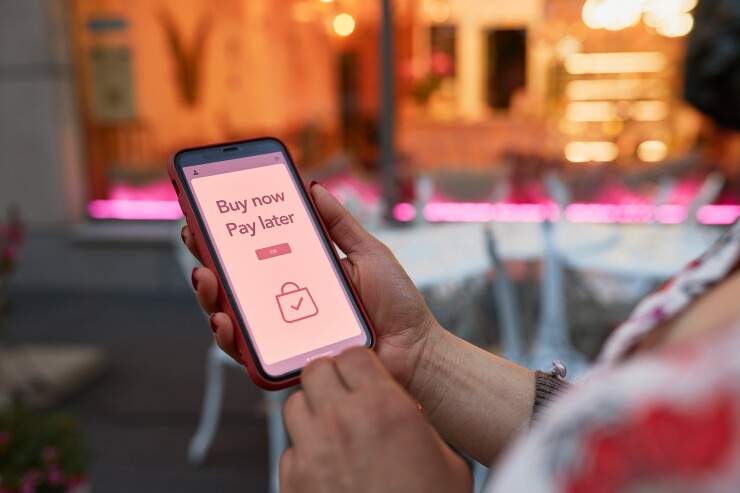
One of the flaws of the booming buy now/pay later loan industry has been its lack of transparency on fees and usage, and a lack of visibility to credit bureaus, especially for so-called "Pay in 4" loans.
Cushion, a San Francisco-based startup, is addressing this issue with a tool it says can help overstretched borrowers pay all their bills through a single dashboard, including BNPL loans from fintechs like Affirm, Afterpay and Klarna that are often fragmented because of their frequency and short duration. Cushion also provides this data to Experian, enabling BNPL borrowers to build their credit history in the process.
"Bill payment got a lot more complicated in recent years with the rise of digital services and subscriptions, and when BNPL loans took off during the pandemic many consumers began losing control of which bills are due when," said Paul Kesserwani, Cushion's founder and CEO.
In addition to its partnership with Experian, Cushion is in discussions to do the same reporting with TransUnion and Equifax in coming months, Kesserwani said.
"Pay in 4 loans aren't interest-bearing, so there's no hard credit pull when a consumer gets one of these short-term BNPL loans, and no penalty if they don't pay, but there's also no path for them to build credit, which is why these users are interested in our tools," Kesserwani said.
Cushion's bill-pay play
Initially founded in 2016 to help consumers fight back against overdraft and ATM fees,
Cushion's retooled offering, which it's been testing since last year, enables users to turn their bill payment tasks over to the service, which includes all payments due for interest-free Pay in 4 loans that typically require repayment in four equal installments over several weeks.
Cushion relies on Plaid to capture users' banking and general bill-payment data, along with emails sent by BNPL lenders reminding borrowers of upcoming Pay in 4 loan payments. Cushion's artificial intelligence-based platform pays each bill as it comes due using a virtual Mastercard issued by tiny Millington, Tennessee-based Patriot Bank that's linked to each user's bank account.
Users tell Cushion the email address they used to take out a BNPL loan, and if it's a Gmail account, Cushion asks Google permission to see only those emails to populate its dashboard, accessible via a mobile-optimized website.
"We've added Yahoo emails, too, but more than 90% of people who get BNPL loans have a Gmail account," Kesserwani said.
The service to track users' BNPL loans is free. If users want to earn credit for BNPL loans and have Cushion pay all their bills, the fee is $5 a month. The firm is testing a $13-a-month version that extends credit-building to their payments for subscriptions, utilities and other routine bills, and includes a service for splitting bills with friends and household members, Kesserwani said.
Cushion is trying to build a following when demand for other bill payment services seems to be slumping. Longtime personal financial management platform
Kesserwani believes Cushion's technology to help consumers manage BNPL loan payments — developed over the last two years — is unique, as is its service enabling Pay in 4 users to start to build a credit history from those payments, which otherwise go unreported.
Although Kesserwani declined to disclose how many consumers are using Cushion, he said the firm is tracking a total of $50 million in BNPL loans. The firm uses social media ads and word-of-mouth to drive awareness.
"People love the product because it simplifies something that's giving them stress," Kesserwani said.
BNPL's regulatory future
Cushion's window of opportunity to bring clarity and credit-building opportunities to BNPL users could be short-lived, since the Consumer Financial Protection Bureau is said to be targeting many of the same pain points in ongoing market research.
The CFPB has long recognized the risk posed to borrowers and other lenders by the
The opacity of BNPL loans was less of a problem during the pandemic when consumers were flush with cash from government stimulus checks and lower expenses, and BNPL fintechs like Affirm, Afterpay and Klarna experienced
The CFPB is expected to introduce guidelines for the BNPL industry following an intensive market inquiry it's been conducting since late 2021. Some BNPL lenders have already begun
One analyst suggests it's too early to tell whether there's enough demand from BNPL borrowers to drive broad interest in complex budgeting tools for these products.
"BNPL loans tend to skew young and toward heavy debit users, who are generally very meticulous about their debit card spending, but there could be an intersection of interest as this market develops," said Hemal Nagarsheth, a partner in the financial services practice of Kearney a global strategy and management consulting firm.
Kesserwani said its data appeals not just to consumers, but also to lenders.
"A lot of people are interested in our dataset because no one knows much about who's taking out all these BNPL loans, and we are starting to gather a lot of this information," Kesserwani said.






